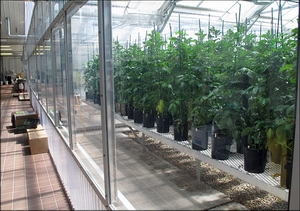 Okanagan Specialty Fruits, of British Columbia, expects U.S. and Canadian government approval this year for two varieties of apple, Granny Smith and Golden Delicious, with their genes modified to prevent browning. That, Okanagan says, can make them look old and undesirable to consumers.
Okanagan Specialty Fruits, of British Columbia, expects U.S. and Canadian government approval this year for two varieties of apple, Granny Smith and Golden Delicious, with their genes modified to prevent browning. That, Okanagan says, can make them look old and undesirable to consumers.Idaho Potato Commission President Frank Muir said Okanagan's experience with consumers once its apples go to market — slated for about 2016 — could be harbinger for the prospects of Simplot's high-tech tater.
"I think it's very likely," Muir said. "Depending on how they react, it could be very similar."
Okanagan's Arctic-brand apples use similar technology to block gene function that Simplot also employed to create its first-generation of engineered potatoes, designed to reduce black spot bruising and lower levels of a potentially harmful substance produced during frying.
Those just started U.S. Department of Agriculture review this month.
This process, called RNA interference, is different from Monsanto Co.'s engineering of a potato in the late 1990s using DNA from foreign microorganisms. Monsanto withdrew the New Leaf potatoes in 2001, after fast-food restaurants shunned them.
In some ways, Okanagan and Simplot couldn't be more different.
Okanagan has seven employees, including owner Neal Carter; privately-held Simplot has 10,000, with 2012 sales of $5.6 billion on products ranging from fertilizer to cattle — and french fries to fast-food giant McDonald's.
But each share goals: using science to solve challenges that have bedeviled growers, processors and retailers.
"The key driver for us is to increase apple consumption," Carter said, of his bid to prevent browning. "Apple consumption has been declining. We really feel that making apples more convenient and having them go into more places like food service and fresh cut is an opportunity to increase demand."
Muir's Idaho potato group, so far, hasn't taken an official position on Simplot's push to commercialize a genetically engineered potato.
Carter hasn't been so lucky. He faces stiff opposition from the U.S. Apple Association and the Northwest Horticultural Council, due to marketing concerns among apple growers.
"We're still skeptical about the value of a non-browning apple, and concerned about the potential marketing effects it would have on the entire apple crop," said Christian Schlect, the Northwest Horticultural Council president.
Both Okanagan and Simplot have taken precautions to protect their businesses from attacks from anti-genetic engineering protesters.
Simplot won't reveal locations of greenhouses and laboratories in southwestern Idaho where it's working on Innate-brand potatoes, including future generations designed to store longer and to resist late blight, which helped cause the Irish potato famine of the mid-19th century.
Carter, an engineer who spent much of his career working internationally, carefully conceals the Washington and New York orchards where Arctic apples are tested. Activists broke into his Canadian facilities in 1999 and destroyed 600 trees, which, he notes, weren't genetically modified.
"We keep things under wraps," Carter said. "It only takes one crazy to do something."





